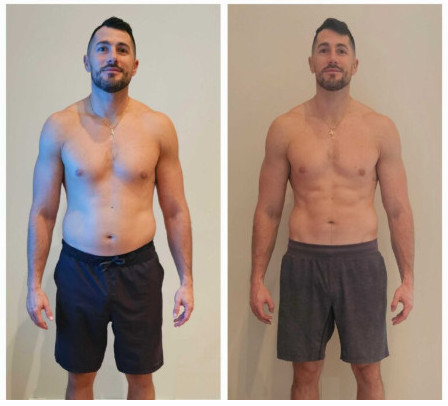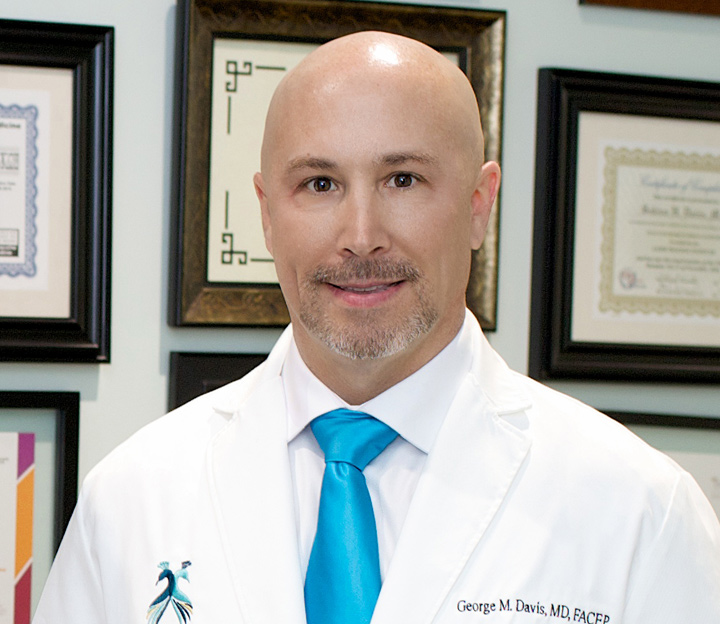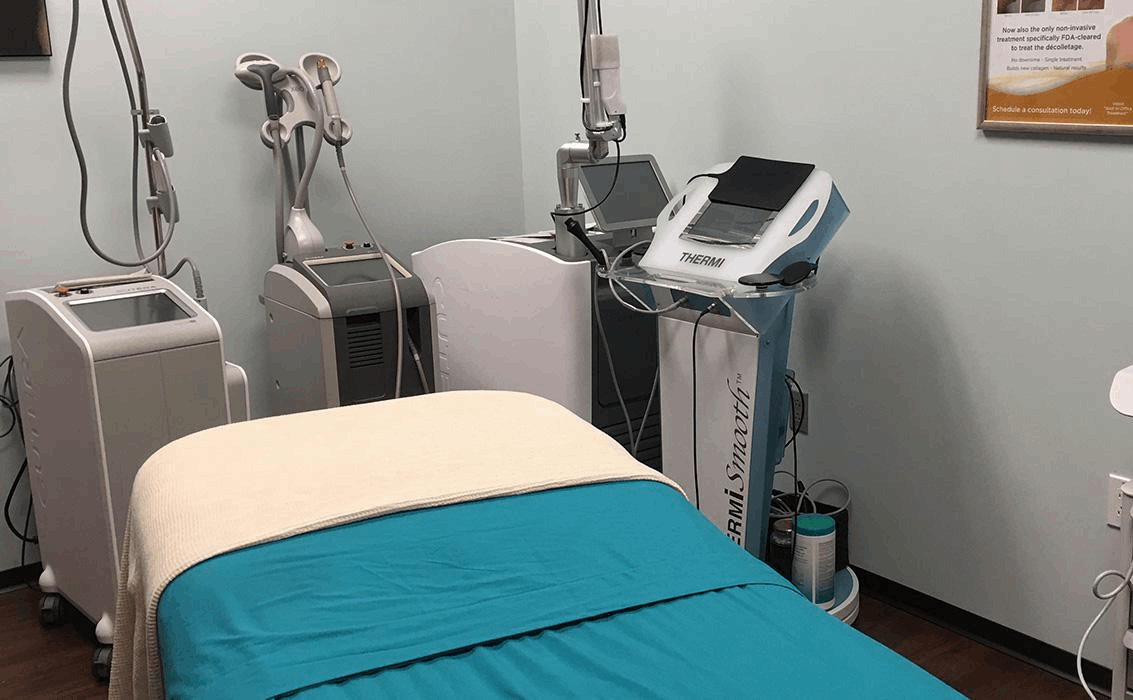Overview
Testosterone can play a significant role in weight gain, especially through mechanisms like increasing muscle mass and redistributing fat. This can sometimes lead to an initial perception of weight gain during testosterone replacement therapy (TRT). We understand that this can be concerning for many individuals.
While some patients may notice temporary weight increases due to water retention or muscle gain, it’s important to remember that effective management through diet and exercise can promote fat loss and enhance overall body composition. In addition, understanding these dynamics during TRT is crucial for your wellness journey.
Together, we can navigate these changes. By focusing on a balanced approach, you can achieve your health goals and feel more confident in your body. If you have any questions or need support, don’t hesitate to reach out. Your journey matters, and we’re here to help you every step of the way.
Introduction
The relationship between testosterone and body composition is a topic that many are curious about, especially as they explore the effects of testosterone replacement therapy (TRT) on weight management. We understand that testosterone plays a crucial role in muscle growth, fat distribution, and overall health. This leads many to wonder: could TRT result in weight gain, or might it actually improve body composition? The truth is, the situation is often more nuanced than it seems.
What factors contribute to changes in weight during TRT? It’s essential to consider various elements that can influence your journey. By understanding these factors, you can better navigate your path toward optimizing your health outcomes. Together, we can explore how to make informed decisions that align with your wellness goals.
Define Testosterone and Its Role in the Body
Testosterone is a steroid hormone that plays a crucial role in our bodies, primarily produced in the testicles for men and the ovaries for women, with smaller amounts coming from the adrenal glands. Understanding its importance can help us address various health concerns, particularly the question of can testosterone make you gain weight as we age. Here’s how testosterone impacts our well-being:
- Muscle Mass and Strength: It promotes muscle growth and strength by enhancing protein synthesis, helping you feel stronger and more capable.
- Fat Distribution: Testosterone influences how fat is stored in the body, leading to the inquiry of can testosterone make you gain weight, which can affect your overall body composition and confidence.
- Bone Density: This hormone is essential for maintaining bone density, reducing the risk of osteoporosis, and supporting your mobility.
- Sexual Function: Crucial for libido and erectile function in men, testosterone also affects sexual desire in women. At Woodlands Wellness & Cosmetic Center, we offer the Male PRP Rejuvenation Shot, which can significantly boost men’s libido and sexual health, addressing these vital aspects of testosterone’s role.
- Mood and Energy Levels: It impacts mood regulation and energy levels, contributing to your overall sense of well-being.
Recognizing these roles is essential for understanding if testosterone replacement therapy (TRT) can testosterone make you gain weight and its potential impacts on body composition and health. Moreover, therapies like the Male PRP Rejuvenation Shot can enhance sexual health, helping you feel more vibrant and connected.
Together, we can explore these options and find the right path for your wellness journey.
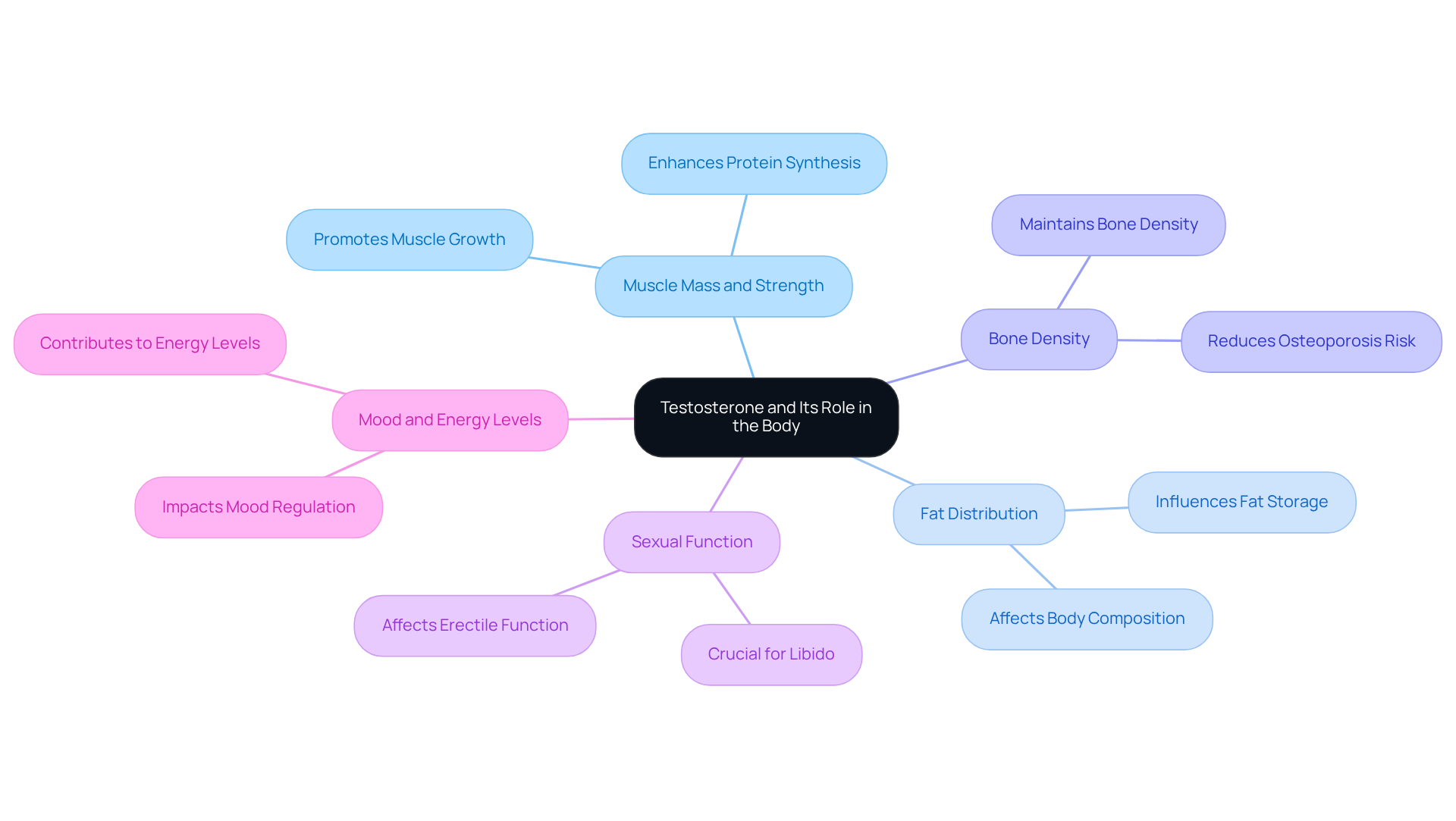
Explore the Connection Between TRT and Weight Gain
Testosterone Replacement Therapy (TRT) can be a vital step for men facing low testosterone levels, helping to restore hormonal balance and improve overall well-being. While TRT offers numerous health benefits, it’s important to understand if can testosterone make you gain weight. Here are some key considerations to keep in mind:
-
Initial Weight Gain: Many patients notice a slight increase in weight shortly after starting TRT. This is often due to temporary water retention rather than fat gain. Don’t worry; this initial increase typically resolves as your body adjusts to the therapy.
-
Muscle Mass Increase: One of the remarkable benefits of TRT is its ability to enhance lean body mass. Since muscle is denser than fat, even if you lose some body fat, your overall mass might still increase due to the added muscle.
-
Fat Redistribution: You might also experience changes in how your body stores fat. Many patients report a decrease in visceral fat—the fat surrounding your organs—while subcutaneous fat, which is just beneath the skin, may increase. This shift can sometimes create the impression of increased mass, even as your body composition improves.
-
Metabolic Effects: Testosterone plays a crucial role in your metabolism. Higher testosterone levels can boost your metabolic rate, potentially aiding in fat loss over time. Research shows that many individuals on TRT see reductions in waist circumference and body fat percentage, especially visceral fat, within 6 to 12 months of starting therapy.
-
Importance of Exercise and Nutrition: Maintaining a balanced approach to managing body composition during TRT is essential. Regular exercise and mindful eating can help you optimize the benefits of your therapy. Remember, a balanced diet and an active lifestyle are your allies in this journey.
-
Increased Appetite: Some individuals may notice an increase in appetite due to enhanced metabolism and energy levels. This can lead to consuming more calories, raising the question of whether can testosterone make you gain weight over time. It’s important to keep an eye on your caloric intake to avoid unwanted gains.
-
Communication with Healthcare Providers: Keeping an open line of communication with your healthcare provider about any changes in your body mass during testosterone therapy is vital. This dialogue can help adjust treatment plans and manage expectations effectively.
-
Healthy vs. Unhealthy Gain: It’s crucial to recognize the difference between healthy gain (increased lean tissue) and unhealthy gain (excess fat). Understanding this distinction can guide your dietary choices and lifestyle adjustments.
-
Monitoring Body Composition: Focusing on body composition rather than just weight is essential during TRT. Tracking muscle definition and fat percentage gives you a clearer picture of your progress and helps you manage your overall health.
Understanding these dynamics is key for anyone on TRT. It not only helps manage expectations regarding changes in body composition but also promotes a holistic approach to health that includes proper nutrition and exercise. Together, we can navigate this journey towards better health.
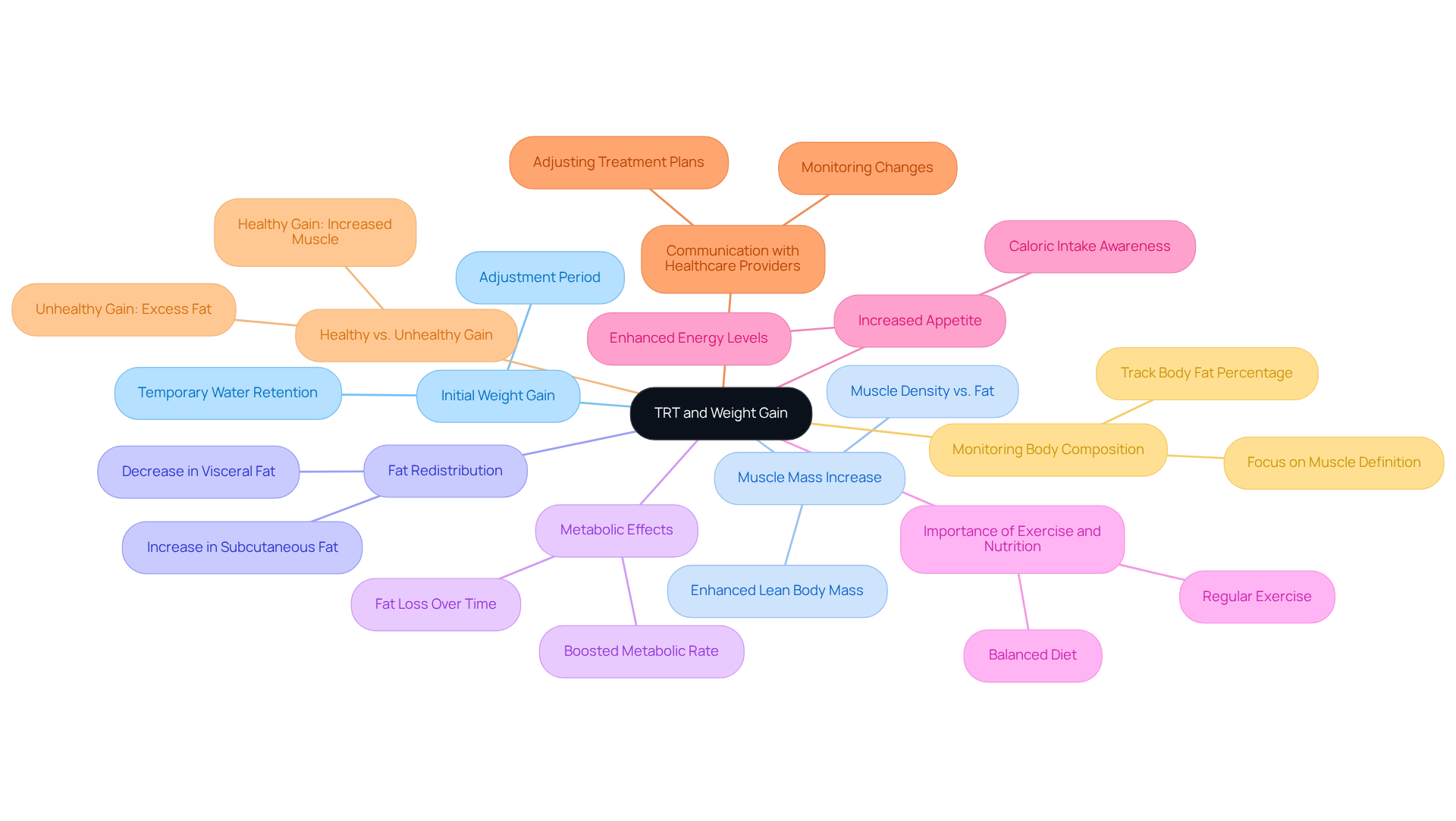
Identify Factors Influencing Weight Changes on TRT
Several factors significantly influence how individuals respond to testosterone replacement therapy (TRT) regarding weight changes:
-
Diet: We understand that the quality and quantity of what you eat are crucial. A balanced diet that emphasizes proteins, healthy fats, and complex carbohydrates can help you gain strength while promoting fat loss. Monitoring your caloric intake and focusing on nutrient-dense foods can prevent excess calorie consumption, which is vital for effective weight management during TRT. For instance, studies indicate that incorporating a balanced diet can enhance fat loss by approximately 1.6 kg when combined with exercise.
-
Exercise: Regular physical activity, especially strength training, is essential for maximizing the benefits of TRT. Research shows that intramuscular TRT has a greater effect size for strength improvements compared to transdermal options. This highlights the importance of exercise in achieving optimal outcomes. Additionally, a case study on testosterone treatment in obese men demonstrated significant reductions in fat mass and visceral fat, emphasizing how exercise works hand-in-hand with TRT.
-
Age: Age can affect your response to TRT. Older individuals often experience different metabolic changes and body composition shifts compared to younger patients. This variation can influence how effectively you build strength or lose fat during treatment.
-
Baseline Hormone Levels: Your initial testosterone levels before starting TRT can influence changes in mass. Individuals with lower initial levels may see more significant enhancements in mass and strength, which can affect overall body dynamics during treatment.
-
Genetics: Genetic factors play a role in body composition and hormonal responses. Personal predispositions can affect how efficiently you develop strength or reduce fat in response to TRT.
-
Overall Health: Pre-existing health conditions, such as metabolic syndrome or thyroid disorders, can significantly influence whether testosterone can make you gain weight during TRT. For example, insulin resistance can interfere with TRT and lead to fat gain. Addressing these underlying issues is crucial for optimizing your treatment outcomes.
-
Body Composition Analysis: Instead of relying solely on the bathroom scale, consider incorporating body composition analysis methods, such as bioelectrical impedance analysis or dual-energy X-ray absorptiometry. These methods provide a clearer picture of your health during TRT by measuring muscle, fat, and water composition. This way, you can track fat loss and muscle gain more effectively.
By understanding and considering these factors, you can set realistic expectations and better manage your body composition during TRT. Together, we can work towards improved health and well-being.
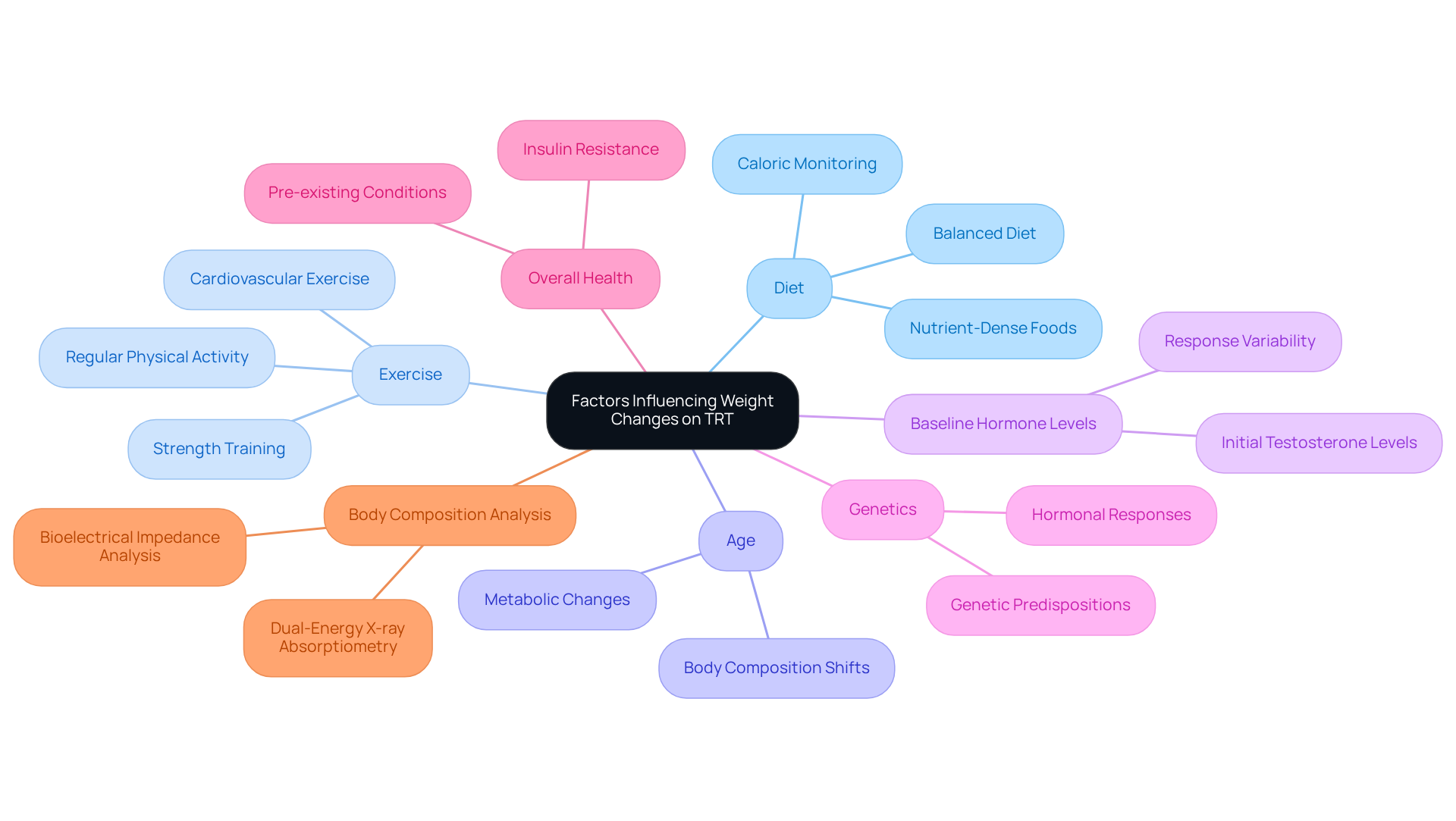
Monitor Your Weight and Health During TRT
Tracking your mass and overall health during testosterone replacement therapy (TRT) is crucial for achieving the best results, especially when combined with the comprehensive medical loss program at Woodlands Wellness & Cosmetic Center. We understand that navigating this journey can be challenging, but there are several key practices that can support you:
- Regular Weigh-Ins: Weigh yourself weekly to spot trends in your weight. This simple practice helps you distinguish between temporary fluctuations and significant changes, allowing for timely interventions. Our professional team is here to guide you in interpreting these trends effectively.
- Body Composition Analysis: Consider methods like Dual-Energy X-ray Absorptiometry (DEXA) scans or bioelectrical impedance analysis to assess changes in lean mass and fat percentage. Research shows that long-term TRT raises the question of whether testosterone can make you gain weight, along with notable reductions in body fat and improvements in lean muscle mass. For instance, one study found that patients undergoing long-term TRT experienced an average loss of 36 pounds, highlighting the importance of these evaluations in monitoring your progress. At Woodlands Wellness, we offer customized evaluations to assist you on your weight loss journey.
- Diet and Exercise Logs: Keeping a journal of your dietary intake and exercise routines can be incredibly beneficial. Monitoring these factors helps you recognize trends that may influence changes in body mass, raising the question of whether testosterone can make you gain weight and paving the way for a more personalized health strategy during TRT. Our team is ready to help you create a sustainable plan that aligns with your goals.
- Health Check-Ups: Regular appointments with your healthcare provider are essential for monitoring hormone levels and overall health. Blood tests play a vital role in assessing testosterone levels and other relevant markers, ensuring your treatment remains effective and safe. While monitoring schedules can vary based on individual needs, routine check-ups are crucial for catching any potential issues early. Our center emphasizes the importance of ongoing support and adjustments as needed.
Adjustments as needed: If you notice significant changes in body mass, you might be asking if testosterone can make you gain weight; don’t hesitate to consult your healthcare provider about potential modifications to your TRT regimen or lifestyle changes. Open communication about your symptoms and health status is key to optimizing your treatment. At Woodlands Wellness, we are dedicated to providing personalized support for your long-term success in weight management.
By actively engaging in these practices and utilizing the resources available at Woodlands Wellness & Cosmetic Center, you can enhance your TRT experience, leading to improved health outcomes and a better quality of life. Together, we can navigate this journey towards your wellness goals.
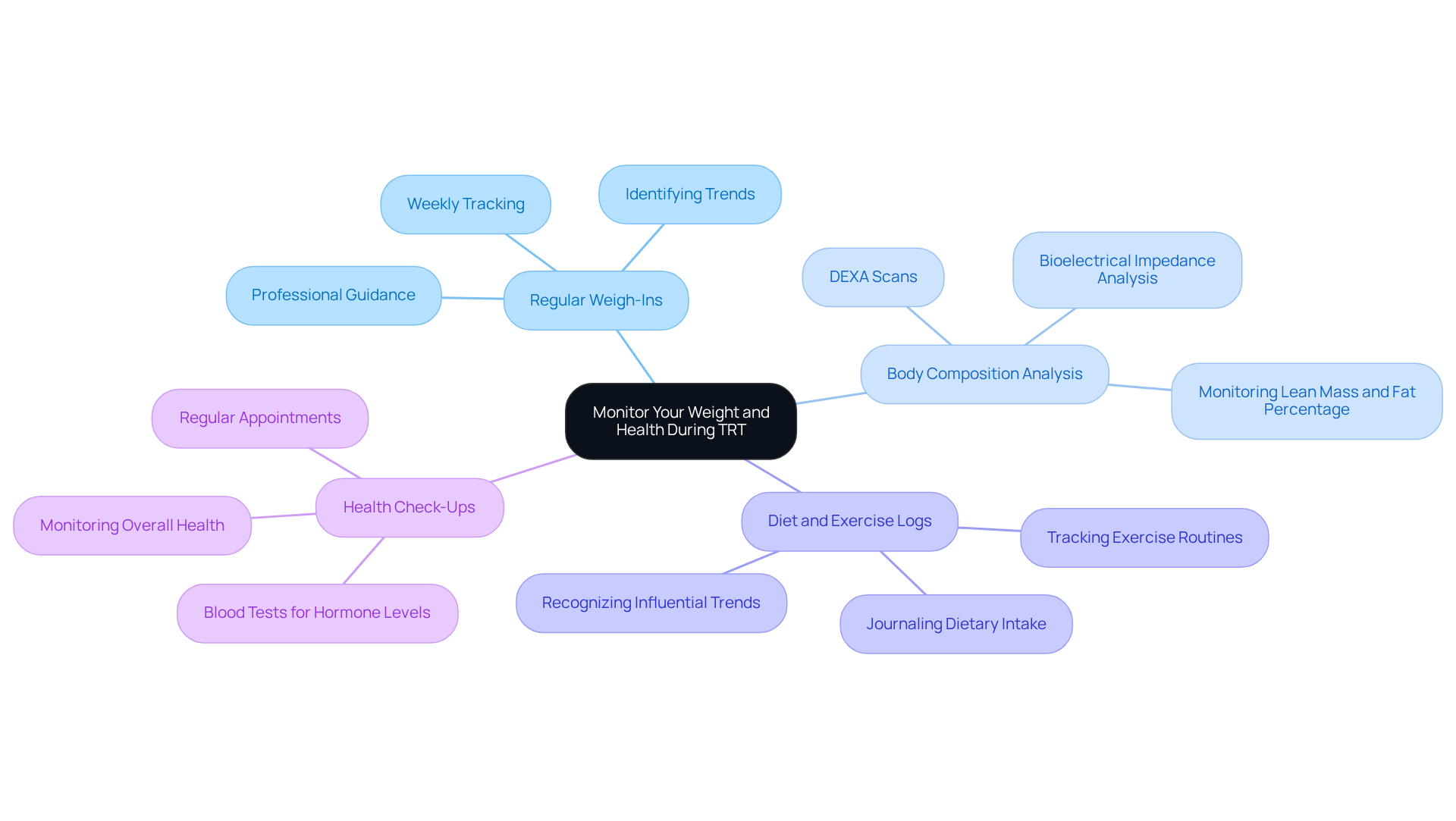
Conclusion
Testosterone plays a crucial role in maintaining various aspects of health, from muscle mass and bone density to mood and sexual function. We understand that navigating these complexities can be challenging, especially when considering testosterone replacement therapy (TRT) and its potential effects on weight. While TRT can lead to initial weight fluctuations, it’s essential to distinguish between healthy increases in muscle mass and unwanted fat gain.
Throughout this journey, key insights about the connection between TRT and weight changes have emerged. You might notice initial weight gain due to water retention, but as therapy progresses, many individuals experience increased muscle mass and improved body composition. Factors such as diet, exercise, age, and overall health significantly influence how one responds to TRT. That’s why monitoring weight and body composition through regular check-ups is vital for achieving optimal results.
In conclusion, managing weight during TRT is a multifaceted journey that requires a proactive approach. By emphasizing a balanced diet, regular exercise, and open communication with healthcare providers, you can greatly enhance the benefits of testosterone therapy. Together, we can navigate this path more effectively, leading to improved well-being and a better quality of life. Embrace this opportunity to take control of your health and explore how TRT can work for you.
Frequently Asked Questions
What is testosterone and where is it produced in the body?
Testosterone is a steroid hormone primarily produced in the testicles for men and the ovaries for women, with smaller amounts coming from the adrenal glands.
What are the main roles of testosterone in the body?
Testosterone plays crucial roles in promoting muscle mass and strength, influencing fat distribution, maintaining bone density, supporting sexual function, and regulating mood and energy levels.
How does testosterone affect muscle mass and strength?
Testosterone enhances protein synthesis, which promotes muscle growth and strength, helping individuals feel stronger and more capable.
Can testosterone influence fat distribution in the body?
Yes, testosterone influences how fat is stored in the body, which can affect overall body composition and confidence.
What is the relationship between testosterone and bone density?
Testosterone is essential for maintaining bone density, which helps reduce the risk of osteoporosis and supports mobility.
How does testosterone affect sexual function?
Testosterone is crucial for libido and erectile function in men and also affects sexual desire in women.
What therapies are available to address testosterone-related concerns?
Therapies such as testosterone replacement therapy (TRT) and the Male PRP Rejuvenation Shot are available to boost libido and enhance sexual health.
How does testosterone impact mood and energy levels?
Testosterone contributes to mood regulation and energy levels, impacting overall well-being.



